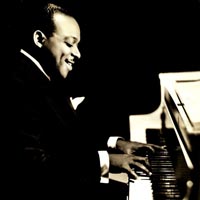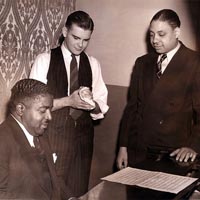In November 1937, Local 627 members elected William Shaw to an eleventh term as President. Other officers elected included Robert Simpson, vice president; Earl W. Jefferson, secretary-treasurer; Harry Carson, sergeant-at-arms and Dr. Dibble, physician. ![]() Harlan Leonard,
Harlan Leonard, ![]() Clarence Davis, Dee Stewart,
Clarence Davis, Dee Stewart, ![]() Bus Moten and Clinton Weaver were elected to the board. Shaw, not content to rest on his laurels, looked to the future by observing "the outlook in Kansas City seems better than it has been in years." Shaw had good reason for optimism. Under his leadership, the union's membership remained stable with around 200 members. Although
Bus Moten and Clinton Weaver were elected to the board. Shaw, not content to rest on his laurels, looked to the future by observing "the outlook in Kansas City seems better than it has been in years." Shaw had good reason for optimism. Under his leadership, the union's membership remained stable with around 200 members. Although ![]() Joe Turner,
Joe Turner, ![]() Pete Johnson,
Pete Johnson, ![]() Andy Kirk, Count Basie and numerous other members had moved on to national acclaim, they maintained their affiliation with Local 627.
Andy Kirk, Count Basie and numerous other members had moved on to national acclaim, they maintained their affiliation with Local 627.
A new generation of bands led by ![]() Tommy Douglas, Harlan Leonard,
Tommy Douglas, Harlan Leonard, ![]() Buster Smith and
Buster Smith and ![]() Jay McShann filled the void left by the departure of the Kirk and Basie bands. These
Jay McShann filled the void left by the departure of the Kirk and Basie bands. These ![]() new bands brought young, up-and-coming musicians into the Union. Charlie Parker joined the union as a provisional member October 31, 1935, becoming a full-fledged member in November, 1936. Parker made his radio debut on May 14, 1938 on the
new bands brought young, up-and-coming musicians into the Union. Charlie Parker joined the union as a provisional member October 31, 1935, becoming a full-fledged member in November, 1936. Parker made his radio debut on May 14, 1938 on the ![]() Vine Street Varieties, a radio program broadcast Saturday afternoons
Vine Street Varieties, a radio program broadcast Saturday afternoons ![]() live from the Lincoln Theater over WHB. A rising but erratic star,
live from the Lincoln Theater over WHB. A rising but erratic star, ![]() Parker passed through the ranks of the Smith and Leonard bands before joining the
Parker passed through the ranks of the Smith and Leonard bands before joining the ![]() Jay McShann band. Originally from Muskogee, Oklahoma, McShann led the last great African American big band from Kansas City to succeed nationally. McShann, Leonard, Basie and Kirk brought the Kansas City style to the national limelight.
Jay McShann band. Originally from Muskogee, Oklahoma, McShann led the last great African American big band from Kansas City to succeed nationally. McShann, Leonard, Basie and Kirk brought the Kansas City style to the national limelight.
In November 1940, journalist and record producer Dave E. Dexter, Jr. produced the first ![]() 78-rpm record album of Kansas City jazz. Dexter gathered together
78-rpm record album of Kansas City jazz. Dexter gathered together ![]() Andy Kirk and his Clouds of Joy, Joe Turner, Pete Johnson, Buster Smith, Eddie Durham and a host of other
Andy Kirk and his Clouds of Joy, Joe Turner, Pete Johnson, Buster Smith, Eddie Durham and a host of other ![]() Kansas City jazz all-stars for the Decca records session. A photograph of Local 627 graced the cover of the set. Pete Johnson's band paid tribute to Local 627 with
Kansas City jazz all-stars for the Decca records session. A photograph of Local 627 graced the cover of the set. Pete Johnson's band paid tribute to Local 627 with ![]() 627 Stomp. In the accompanying booklet Dexter noted that "in the center of Kansas City's Harlem district, at 1823 Highland, there stands a two-story wooden building which houses Musicians' Local no. 627. On its membership roll are the names of hundreds of now famous colored jazzmen, virtually all of whom still keep their cards paid up. William Shaw for fifteen years has been president of the union and it is in his honor, and the honor of 627, that Johnson's Kaycee Orchestra plays this number in this album." Released to critical acclaim, the Kansas City Jazz album set established Kansas City's reputation as a
627 Stomp. In the accompanying booklet Dexter noted that "in the center of Kansas City's Harlem district, at 1823 Highland, there stands a two-story wooden building which houses Musicians' Local no. 627. On its membership roll are the names of hundreds of now famous colored jazzmen, virtually all of whom still keep their cards paid up. William Shaw for fifteen years has been president of the union and it is in his honor, and the honor of 627, that Johnson's Kaycee Orchestra plays this number in this album." Released to critical acclaim, the Kansas City Jazz album set established Kansas City's reputation as a ![]() jazz center along with New Orleans, Chicago and New York.
jazz center along with New Orleans, Chicago and New York.
Ironically, at the same time Dexter celebrated Kansas City jazz style with the Kansas City Jazz album, a civic cleanup put a damper on the ![]() local scene. In 1938, Missouri Governor
local scene. In 1938, Missouri Governor ![]() Lloyd Stark declared war on the vice and corruption that fostered Kansas City jazz. The ensuing raids on
Lloyd Stark declared war on the vice and corruption that fostered Kansas City jazz. The ensuing raids on ![]() night clubs put musicians out of work. Reformers with small brooms on their lapels swept
night clubs put musicians out of work. Reformers with small brooms on their lapels swept ![]() 12th Street clean of vice. By 1941, the cleanup reached such a fevered pitch that local authorities banned
12th Street clean of vice. By 1941, the cleanup reached such a fevered pitch that local authorities banned ![]() Julia Lee from her long-term engagement at Milton's for performing risque songs she referred to as "songs my mother taught me not to sing." Unable to find
Julia Lee from her long-term engagement at Milton's for performing risque songs she referred to as "songs my mother taught me not to sing." Unable to find ![]() steady work many musicians took daytime jobs.
steady work many musicians took daytime jobs.



